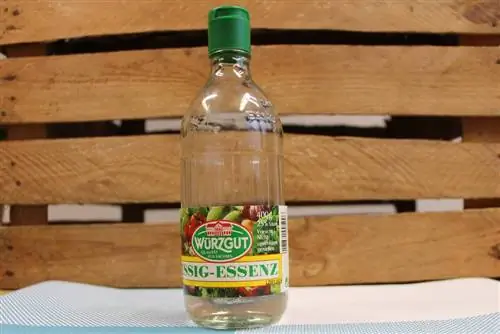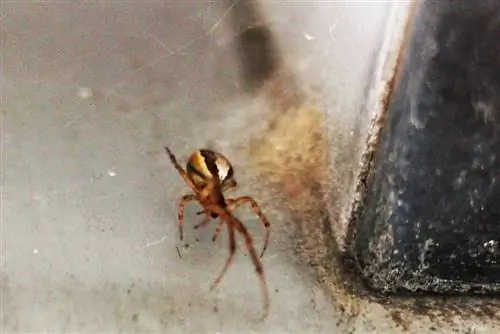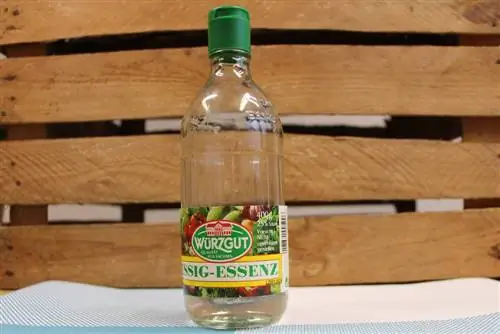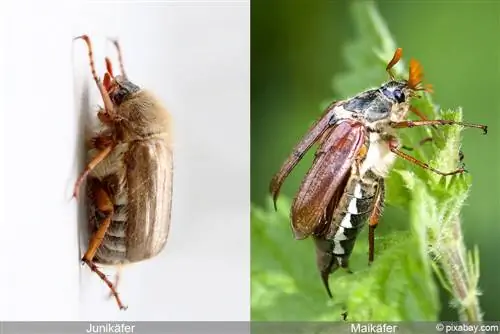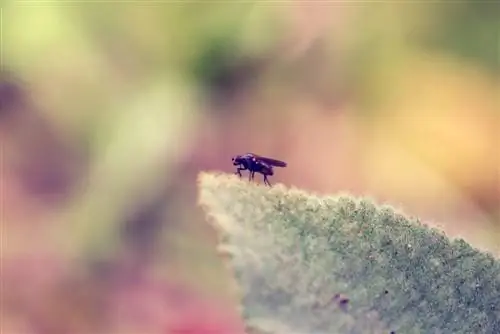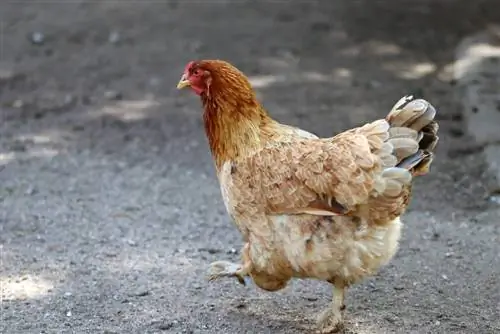- Author admin caroline@plants-knowledge.com.
- Public 2023-12-17 03:39.
- Last modified 2025-01-24 12:45.
When the temperatures rise and the flora is in full bloom, we humans are also visited by insects in our own four walls. Vinegar flies are not classic pests. However, due to their strong desire to reproduce, the flies, which are only a few millimeters in size, could certainly be described as “annoying”. You often attract these little pests into your home by buying fermenting fruit. To get rid of the flies, you can use a few simple tricks and home remedies.
Winged pests in the kitchen
Well over 50 different types of fruit fly species are known in Germany. Information that is probably of less interest to people plagued by vinegar flies. The insects, which are only a few millimeters long, can be found in almost every kitchen during the warm season. At first glance, the animals are often confused with fungus gnats, which are considered aggressive plant pests. Only a closer look and the animals' lifestyle provide detailed information about which type of insect they are. But these animals are not only more common in the hot summer months. The flies, which come from the tropics, are considered to be cultural followers and also feel extremely comfortable in our own four walls. The insects find paradisiacal conditions here all year round. A small fermentation point on a forgotten grape is enough to attract hordes of flies.
The fruit flies, which are harmless to humans - often also known as dew, fruit, fermentation or must flies - feed on fermenting substances. In the wild, Drosophilidae are often found in compost. In your home, you prefer fruit and leftover drinks. But wine and vinegar are by no means spurned by the small flying insects. A circumstance that you can definitely take advantage of when fighting doubters.
Simple remedies for fruit flies
There is no cure for vinegar flies, but you don't have to accept an invasion of the pests. The first effective measure against vinegar flies starts with shopping. Be extremely vigilant when buying fruit and vegetables and inspect open foods particularly carefully. Fruits packed in containers, such as grapes, oranges and apples, are particularly tempting for fruit flies. But you should also be careful with beverage packs that are stuck with the remains of spilled juice cartons. The eggs of Drosophilidae cannot be seen with the naked eye, but can already be attached to the contaminated surface.
To get rid of fruit flies, you should first try a few simple tricks. The winged pests feel most comfortable in a comfortably warm, windless environment. Change this condition and ensure sufficient ventilation of the affected location. At the same time, you should move the insects' food source outside. This will cause the majority of vinegar flies to disappear from the premises immediately. Depending on the progress of the fermentation process, you should also thoroughly clean the surrounding area. Rinse contaminated fruit that does not yet show any damage under running water. Once this breeding ground for animals has been removed, you can use a vacuum cleaner to reduce the number of remaining flying insects enormously.
Tip:
Even residual or organic waste can be an ideal food source for vinegar flies. Dispose of these regularly in summer and keep the rubbish indoors in closed containers.
Specialist retailers also have a variety of products with which you can declare war on annoying fruit flies. In addition to funnel traps, UV light for the socket is extremely popular. The flies are lured into the lamp without chemicals and die there on a high-voltage grid. Realistically, however, the chances of success in getting rid of all insects are rather slim. Therefore, you should only use this method if you have neither the time nor the motivation to get rid of the vinegar flies using other measures. Avoid using chemicals. The effect of these agents is often minimal due to the size of the insects. In fact, there is a risk that you will be putting your he alth at risk.
The best home remedies against the little pests
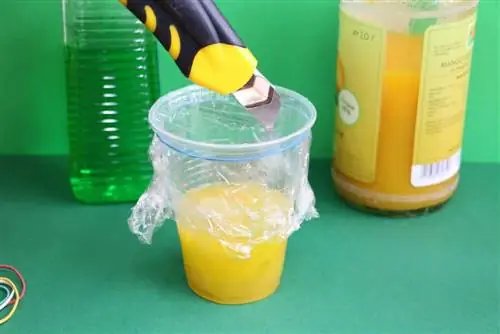
If neither a vacuum cleaner nor a proper draft can help, you should use other methods. The small flying insects are almost magically attracted to fermenting substances and liquids. Take advantage of this to lure the pests into the trap. In heavily infested locations, place a glass filled with a slightly fermenting liquid. With a few drops of detergent you destroy the surface tension of the liquid and thereby prevent the vinegar flies from using the trap as another source of food. You can use the following for this:
- Red wine
- Vinegar
- fruit juice
- Beer
- Champagne
It is also particularly effective if you cover the container with a transparent, slightly perforated film. The mosquitoes find their way inside and die inside. The funnel traps from the trade that have already been briefly mentioned work according to a similar principle. The flies are attracted with an attractant, and a specially designed vessel shape prevents the insects from flying away again.
Vinegar flies don't stop at fruit on baked goods. Here it is often more than just unhygienic and undesirable to set up traps in the immediate vicinity. Here, however, you can use another trick: Halve a lemon and stud the flesh with cloves. The intense smell has a repellent effect on the insects, and the majority of them will avoid the area. To maintain protection, you should use a fresh lemon approximately every 2 to 3 days.
Of course there are also natural enemies that the fermentation flies literally like to eat and which effectively support you in combating them. However, you don't have to give refuge to a second species of insect, but rather fill your windowsill with carnivorous plants. Sundews, Venus flytraps and funnel plants effectively attract flies. Almost all types of carnivorous plants are easy to cultivate and provide themselves with important nutrients and minerals through meaty food. The only thing you shouldn't forget to water is because the root ball of the swamp plants must not dry out. With ideal care and the right location, these plants will help you fight all kinds of insects for several years.
Conclusion
The appearance of vinegar flies is not a hygiene problem. It often happens when you go shopping that the insects or at least their eggs stick to the fruit and vegetables. As annoying as fermentation flies seem, they cannot be immediately classified as pests. The fight can be done with simple home remedies and methods; chemical products do not have to be used.
What you should know about vinegar flies soon
Get rid of vinegar flies with simple home remedies
- Pour a mixture of beer (leftovers), vinegar (fruit vinegar is recommended) and dishwashing liquid into a compote bowl and place it next to the infected fruit basket or near the trash can. The smell of vinegar attracts annoying flies. The detergent destroys the surface tension on the water and the flies dive under.
- Another option is to suck up the flies with a vacuum cleaner. However, this only makes sense if it is a modern vacuum cleaner with very tight filters that prevent flies from escaping.
- Cloves or basil, for example, are said to have a deterrent effect on fruit flies.
Build a vinegar fly trap
- a jam jar
- some cling film
- Household rubber
- Darning needle
- some sweet juice or a piece of overripe banana
Put the sweet juice or overripe fruit into the jam jar as bait. The opening is then closed with cling film and household rubber. Use the darning needle to make several openings that are as small as possible into the foil. The fruit flies are attracted by the sweet scent of the bait, slip through the holes into the glass, but usually cannot find their way out again.
Fighting vinegar flies on plants
- Yellow boards with glue coating
- Blue light trap with adhesive surface inside or with electricity destruction
- Special fly bait boxes
- Sprays such as the active ingredients pyrethrum, tea tree or neem oil
Prevention
- do not leave fermenting or rotting fruit lying around in the open
- Do not leave juice, beer, wine or sweet liquids open
- wipe up spills immediately
- Take trash and leftover food outside regularly
Tip:
Did you know that aquarists love using vinegar flies as fish food?

